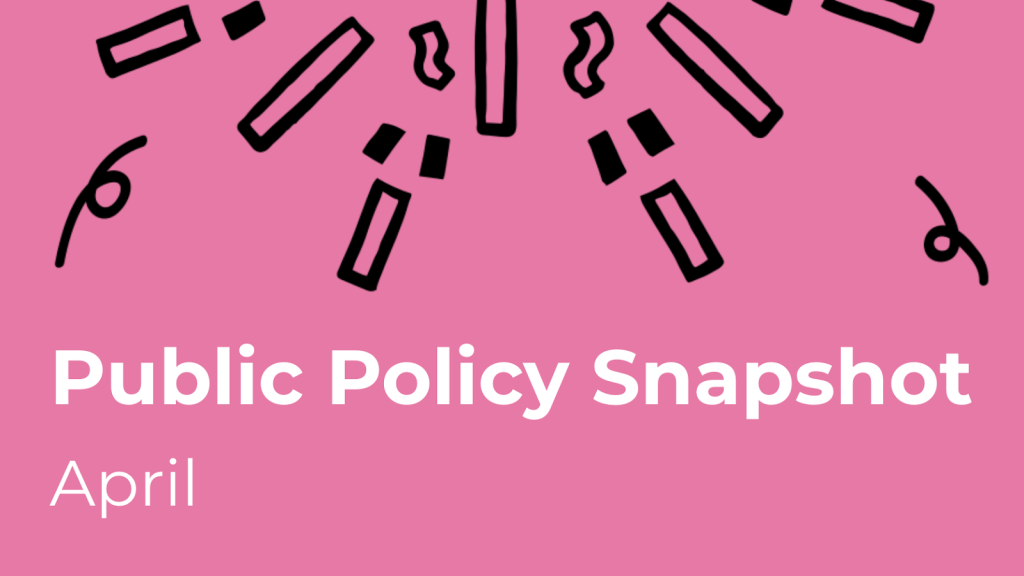
Welcome to the “Don’t Blink” series! Every month we share developments from around the world that shape people’s ability to participate in the free knowledge movement. In case you blinked this month, here are the most important public policy advocacy topics that have kept the Wikimedia Foundation busy.
The Global Advocacy team works to advocate laws and policies that protect the volunteer community-led Wikimedia model, Wikimedia’s people, and the Wikimedia movement’s core values. To learn more about us and the work we do with the rest of the Foundation, visit our Meta-Wiki webpage, follow us on Twitter (@WikimediaPolicy), or sign up to our Wikimedia public policy mailing list.
________
Protecting Wikimedia’s Values
(Work related to human rights and countering disinformation)
Wikimedians Presenting at RightsCon
[Register for this upcoming event + read our blog post]
RightsCon’23 is a conference hosted by Access Now that brings all kinds of civil society stakeholders together to discuss how to build a shared digital future where human rights can thrive. This year, Wikimedians will host and participate in five sessions, which will be held online and in-person in San José, Costa Rica, from 5–8 June. These sessions illustrate how vital the work of the movement is to enable access and participation in free knowledge as well as achieve sociotechnical goals—from helping a country remember and prevent a violent history, learning about labor issues from the perspectives of Black and Indigenous peoples, or uplifting decentralized technologies as tools to carve out civic spaces online. You can register to watch them online for free until 2 June, and read our blog post on the sessions for more details.
Open-Source Platforms as Repositories of Shared Knowledge and Memory about Conflict
[Read our blog post]
Contemporary digital technologies are having an impact on our collective memory, with open-source platforms increasingly becoming the dominant way to remember past atrocities. On 17 April, Valentina Vera-Quiroz, our Human Rights, Tech, and Policy Fellow, published a blog post that aims to broaden understanding of how online platforms such as Wikipedia can become vehicles for collective memory, ensure that what happened in the past is not forgotten, and that perpetrators of crimes and abuses are held accountable. Read Valentina’s blog post, and if you are interested in RightsCon’23, be sure to watch Valentina discuss the topic in her lightning talk, “Shall We Forget? Open-Source Platforms as Tools for Memory, Truth, and Reconciliation,” in person or online this 6 April, from 17:30–18:30 UTC.
Protecting the Wikimedia model
(Work related to access to knowledge and freedom of expression)
Digital Rights and Inclusion Forum 2023 (DRIF23)
[Read our blog post]
From 12–14 April, Wikimedians and Foundation staff presented in three sessions at the Digital Rights and Inclusion Forum 2023: Building a Sustainable Internet Future for All (DRIF23) in Nairobi, Kenya. The event is attended by African digital rights activists, scholars, and policymakers, with whom we share a multi-stakeholder approach and efforts to ensure equitable, affordable, and meaningful internet access. This was our second year supporting the event, which was hosted by Paradigm Initiative, and the first time that Wikimedians from the region participated in the event. Read our blog post, where we spoke with the people who made Foundation support of DRIF possible, and with the six Wikimedians who represented the movement at the forum about their experience, and why they think that supporting this forum matters to advance rights-respecting digital practices as well as the Wikimedia model and work.
Additional Developments
(Other work we want to share with you)
Talk at Yale Information Society Project (ISP)
[Watch our talk]
Rebecca MacKinnon, our Vice President of Global Advocacy, was invited to give a talk at Yale Law School’s Information Society Project (ISP), a community of interdisciplinary researchers that explores cutting-edge issues concerning technology, law, and society. Rebecca connected the concerns that she first wrote about in her 2012 book, Consent of the Networked, with today’s’ quickly changing digital and geopolitical landscape. During her talk, she discussed the challenges in holding global internet intermediaries accountable to the public interest, and the progress that has been made—and not made—during this last decade. Watch Rebecca’s talk in March, recently uploaded, to learn more about why corporate accountability, human rights standards, and multi-stakeholder governance are needed to create a global culture of digital citizens and activism.
Submission to Global Digital Compact
[Read our publication]
The Global Digital Compact is an intergovernmental consultative process open to all stakeholders—i.e., governments, the United Nations system, the private sector (including tech companies), civil society, grass-roots organizations, academia, and individuals, including youth—so they can outline shared principles for “an open, free, and secure digital future for all.” The Foundation contributed to the process because we consider it an opportunity to share our views with the international community, and to help to shape the deliberations on the Global Digital Compact, whose content will be agreed during the Summit of the Future to be held in September 2024. We submitted our responses to a survey as well as released them as a digital publication. We are also participating in the thematic deep-dives that are running from March through June. Read our contribution to better understand the Foundation’s priorities in advocating for a shared digital future that protects and supports free and open knowledge.
________
Follow us on Twitter, visit our Meta-Wiki webpage, or join our Wikipedia policy mailing list for updates. We hope to see you there!

Can you help us translate this article?
In order for this article to reach as many people as possible we would like your help. Can you translate this article to get the message out?
Start translation